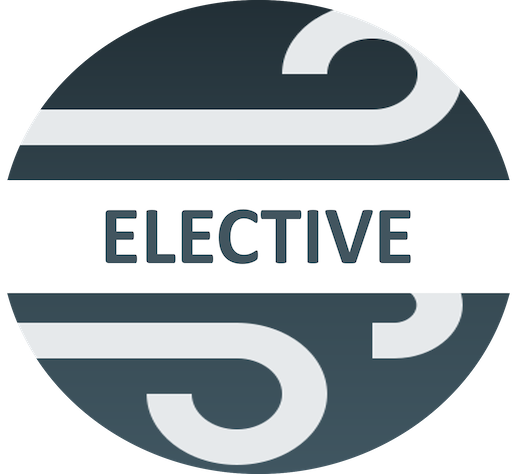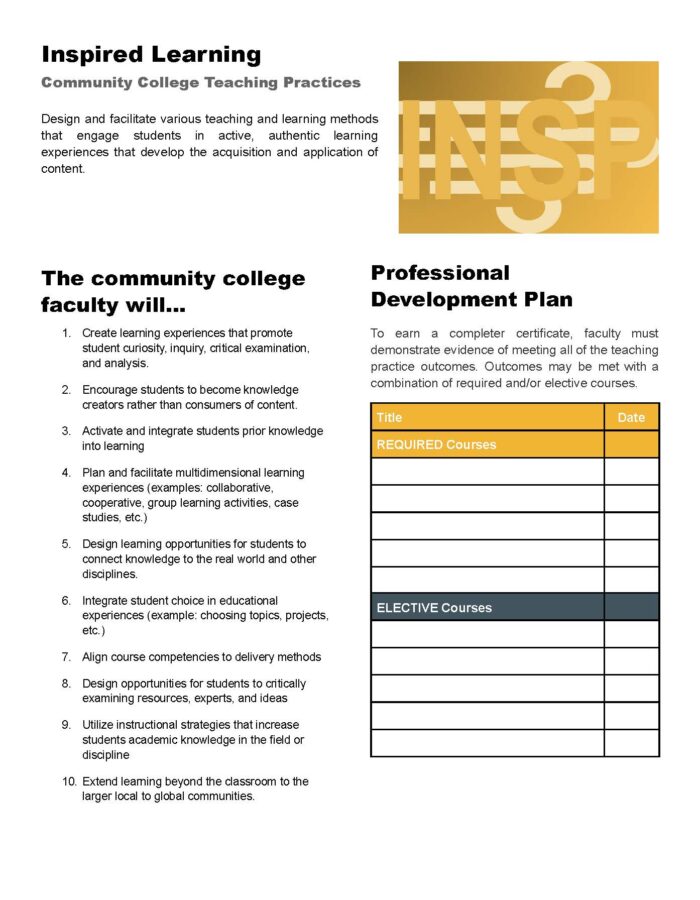Inspired Learning
Design and facilitate various teaching and learning methods that engage students in active, authentic learning experiences that develop the acquisition and application of content.
The community college faculty will be able to…
- Create learning experiences that promote student curiosity, inquiry, critical examination, and analysis.
- Encourage students to become knowledge creators rather than consumers of content.
- Activate and integrate students prior knowledge into learning
- Plan and facilitate multidimensional learning experiences (examples: collaborative, cooperative, group learning activities, case studies, etc.)
- Design learning opportunities for students to connect knowledge to the real world and other disciplines.
- Integrate student choice in educational experiences (example: choosing topics, projects, etc.)
- Align course competencies to delivery methods
- Design opportunities for students to critically examining resources, experts, and ideas
- Utilize instructional strategies that increase students academic knowledge in the field or discipline
- Extend learning beyond the classroom to the larger local to global communities.
Professional Development
To earn a completer certificate, faculty must demonstrate evidence of meeting all of the teaching practice outcomes. Outcomes may be met with a combination of required and/or elective courses. Access the CTL calendar to explore upcoming sessions.

Community Immersion
This workshop experience was designed to help MCC employees gain a better understanding of themselves as employees in a diverse community, gain a better understanding of the community including its challenges and resources, and develop a deep understanding of the experiences of the students and families with whom they will work. During the session, Deanna Villanueva-Saucedo will take us on a pre-recorded tour of the community that envelops the MCC Southern & Dobson campus. The session facilitator will share resources to explore and discuss the community’s diverse historical roots, the varied socioeconomic and ethnic populations, and issues of racialization, segregation, and marginalization of some areas within the community. Outcome 10

Course Planning 101
After exploring the situation factors that influence course design, participants will apply the principle of alignment to establish learning goals, draft teaching and learning activities, and determine the type of assessments that will provide direct evidence of student learning. This foundational workshop may be applied to course planning across modalities. Outcome 7

Instructional Scaffolds
Like scaffolds used in construction, effective instructional practices utilize techniques that offer support and guidance for students to make meaning out of new knowledge. Scaffolds are systematically integrated into lesson design and delivery for students to access prior knowledge while developing strategies to process and retain new information. Participants will experience lessons and activities that model techniques to embed instructional scaffolds for learning. Outcomes 3, 9

Student Engagement for Transformed Learning
This session uses the topic of program models for English learners for participants to experience a lesson that elevates student engagement and transformative learning. The session will provide opportunities for participants to pose questions, investigate resources, and relate new learning to what they already know to make an informed decision. Outcomes 1, 4-5

First Fridays! Student Engagement Techniques
MCC faculty are invited to join us for First Fridays to explore teaching techniques that may be used online, in-person, or in hybrid format to help students to learn and retain new knowledge and skills. During each session, we will investigate a handful of techniques and identify ways to integrate them into practice. Outcomes 1, 3

Problem-based Learning: Can you trust the water?
Understanding all of the different ways that water can cause problems in a society can be a big challenge. This relevant topic is used for session participants to experience Problem-Based Learning (PBL) and apply this instructional methodology to a variety of disciplines. CTL endorsed learning principles will be integrated in the session to maximize inclusion and academic achievement. Outcomes 1-5 and 7-10

